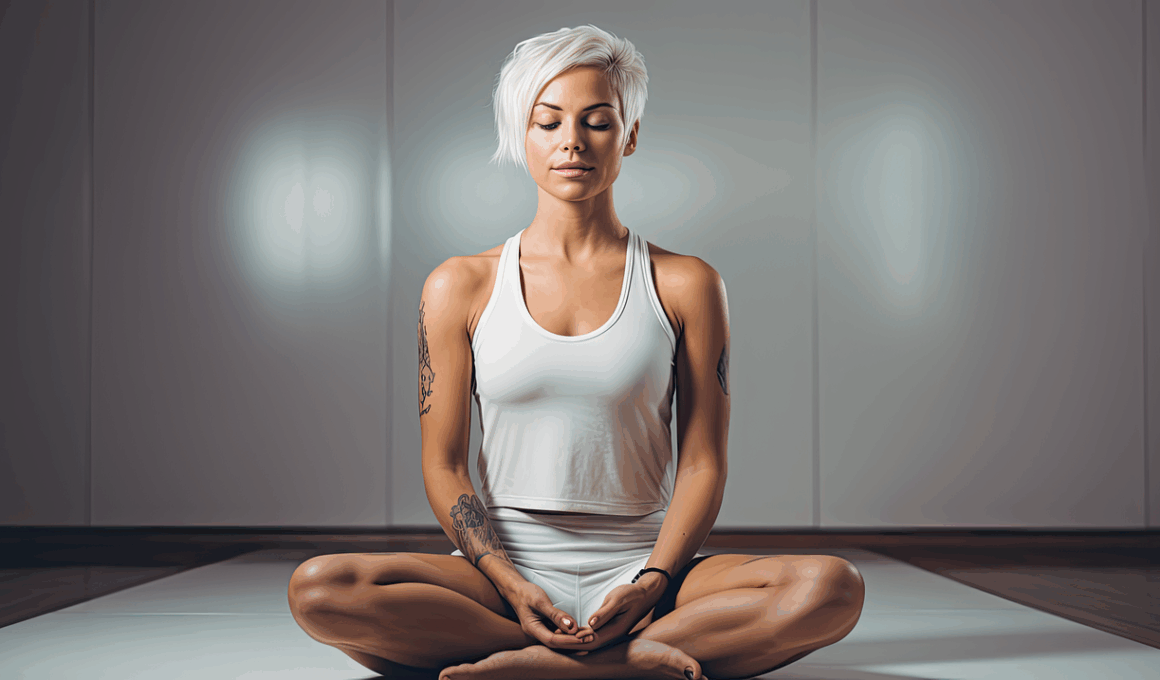Yoga and Pilates: Complementary Practices for Stress Relief
Stress is a prevalent issue in modern life, impacting mental and physical health more than we often realize. Various techniques can help alleviate stress, with yoga and Pilates being two particularly effective practices. Both focus on body awareness and mindfulness but approach these concepts in unique ways. Yoga combines physical postures, breathing exercises, and meditation to cultivate a sense of peace and relaxation. On the other hand, Pilates emphasizes core strength, flexibility, and functional movement, contributing to overall body awareness. By integrating these disciplines, individuals can create a holistic approach to stress management that fosters both physical and mental well-being. Regular engagement in yoga and Pilates can significantly reduce anxiety and promote relaxation. Moreover, incorporating these practices into your daily routine can help you establish a more balanced life. Whether through guided sessions or individual practice, exploring these disciplines is beneficial. Start your journey toward self-discovery and stress relief today; your mind and body will thank you for it. Embrace the union of breath, movement, and stillness to harmonize your inner self in challenging times.
The Benefits of Yoga for Stress Relief
Yoga offers several significant benefits for managing stress levels, starting with its ability to enhance relaxation. By practicing various poses, focused breathing, and meditation techniques, practitioners can activate the body’s relaxation response while decreasing stress hormones. This physiological response leads to a calmer mind, allowing individuals to cope more effectively with daily pressures. Additionally, yoga increases flexibility and strength, which not only improves physical health but also aids mental clarity. Regular practice fosters self-discipline and mindfulness, skills essential for stress management. Another aspect to consider is the community connection found in yoga classes, as group settings often provide valuable social support. Engaging in this collective experience helps to reduce feelings of isolation often associated with stress. Moreover, individual practices can be deeply personal, allowing a space for self-reflection and emotional processing. By tuning into their bodies and minds, practitioners gain insight into their stress triggers and learn how to navigate them more effectively. Consequently, yoga encourages a more resilient mindset and empowers individuals to face challenges with positivity and self-assurance, fostering long-term emotional balance and well-being.
As yoga cultivates mindfulness, the practice encourages individuals to focus on the present moment. This emphasis on now makes it easier to let go of past worries and future anxieties. Additionally, integrating breath control in yoga helps regulate emotions effectively. The synchronization between breath and movement helps create a natural flow that can lead to a deeper sense of relaxation. Furthermore, participants often report enhanced self-awareness, enabling them to recognize stress signals more readily. This recognition allows for timely intervention, grounding techniques, and self-care practices. Engaging in restorative yoga poses, such as Child’s Pose or Corpse Pose, further deepens relaxation and assists the body in releasing tension. These restorative practices are perfect for individuals seeking a soothing escape from stress. Moreover, yoga cultivates an overall sense of connection with oneself, aiding emotional healing. Overall, a consistent yoga practice can lead to improved life quality, decreasing symptoms of stress while promoting a peaceful mindset. Incorporating yoga into daily life may foster resilience against challenges, enabling you to navigate stress with a positive perspective. So, embrace the transformative power of yoga, and discover the refuge it could provide.
How Pilates Aids in Stress Management
Pilates is another excellent practice for helping to alleviate stress through a focus on body control and awareness. This method emphasizes low-impact, core-strengthening exercises, enhancing overall physical stability and resilience. With a strong core, individuals gain better posture, which ultimately contributes to improved moods and decreased stress levels. Regular practice encourages individuals to move mindfully, creating a deeper connection between the mind and body. This mind-body connection is essential for managing stress, as it helps bring awareness to bodily sensations and emotional states. Moreover, incorporating controlled breathing techniques in Pilates facilitates a more relaxed mental state. As practitioners become more attuned to their breath, they learn how to utilize it to calm the mind during stressful situations. Engaging in a Pilates session encourages participants to focus solely on their movements, providing a refreshing mental break from daily challenges. Consistently practicing Pilates fosters discipline and self-care, as it requires dedication and commitment. Ultimately, it serves as a proactive approach to stress management, empowering individuals to tackle daily hurdles with confidence and clarity. By embracing Pilates, you can enhance both your physical and emotional resilience.
Furthermore, Pilates practices encourage an appreciation for the body and its capabilities, reinforcing positive self-image. Participants often develop greater awareness of their limitations and strengths, promoting self-acceptance and reducing negative self-talk. This shift in mindset can significantly influence how one manages stress, as enhancing self-esteem allows for a more balanced perspective on challenges. With improved core stability and strength, individuals tend to experience better balance and coordination in everyday activities, further contributing to reduced stress. Pilates can be practiced by anyone, regardless of fitness level, making it accessible to diverse populations. Individual and group classes can cater to a range of needs and preferences, ensuring everyone can enjoy its benefits. Engaging in sessions guided by qualified instructors ensures proper form and alignment, maximizing wellness benefits while minimizing injury risk. Additionally, exploring various styles of Pilates, from mat work to reformer-based exercises, keeps the practice exciting and ensures continuous learning. Incorporating playful exploration into your Pilates journey may further encourage consistency and a sense of joy amidst challenging moments, ultimately fostering a resilient mindset in the face of stress.
Integrating Yoga and Pilates for Maximum Stress Relief
Combining yoga and Pilates offers the best of both practices, resulting in a comprehensive approach to stress management. Each discipline complements the other, creating a balanced routine that targets both physical and mental well-being. By blending yoga’s fluid, meditative qualities with Pilates’ focus on core strength and stability, practitioners can achieve a higher level of body awareness. Exploring a sequence that integrates both modalities can enhance relaxation while improving strength and flexibility. In a combined class setting, instructors often guide participants through a series of movements that interconnect breath, postures, and core engagement efficiently. This fusion creates a seamless transition between practices, promoting mindfulness throughout the session. Furthermore, individuals can tailor their routines to meet their specific needs and preferences, resulting in a personalized journey towards stress relief. Whether through dedicated yoga and Pilates classes or individual sessions, integrating both disciplines cultivates resilience and self-awareness. Participants often report feeling more centered and balanced after completing a combined practice, empowering them to face daily challenges with renewed vigor. Embrace the synergy that yoga and Pilates present for ultimate stress management and emotional wellness.
Ultimately, committing to a routine that incorporates both yoga and Pilates can lead to lasting stress relief and improved life quality. As practitioners develop strength, flexibility, and mindfulness skills, they find themselves better equipped to handle life’s pressures. Remember that finding the right balance is essential; you don’t need to achieve perfection in every pose or movement. Consistency is key, offering you a chance to build resilience over time. Seek guidance from experienced instructors to ensure proper form and safety while practicing. Additionally, explore various styles and sequences, adapting your practice to meet your evolving needs. It’s also important to listen to your body and honor its limitations, adjusting your practice accordingly. Beyond the physical benefits, the emotional healing experienced through these practices often results in a more positive mindset and personal growth. Above all, engaging in yoga and Pilates allows for a journey toward self-discovery, empowerment, and better stress management techniques. Therefore, whether you’re seeking relief from the pressures of daily life or aiming for personal development, integrating yoga and Pilates into your routine is an investment in your health and well-being.
Incorporating moments of gratitude and reflection within your combined yoga and Pilates practice can further bolster mental well-being and help reduce stress levels. Regularly acknowledging your progress, no matter how small, fosters a positive mindset that enhances emotional resilience. Consequently, cultivating gratitude allows for a deeper appreciation of the process and every little success. Moreover, setting personal goals or intentions for each session can help keep you focused and motivated, encouraging a commitment to self-care. Remember, the journey towards stress relief is deeply individual and requires patience and empathy towards oneself. Progress may ebb and flow, but with dedication and the right mindset, you can achieve significant changes in your overall well-being. Connecting with others through workshops and community events can enhance your experience while providing support along the way. Sharing your successes and challenges fosters growth and understanding. Therefore, explore online and local community resources to engage with those who share similar goals. By creating a supportive network, you will discover the benefits of yoga and Pilates extend beyond physical practice, leading to lasting relationships and deeper emotional connections.


